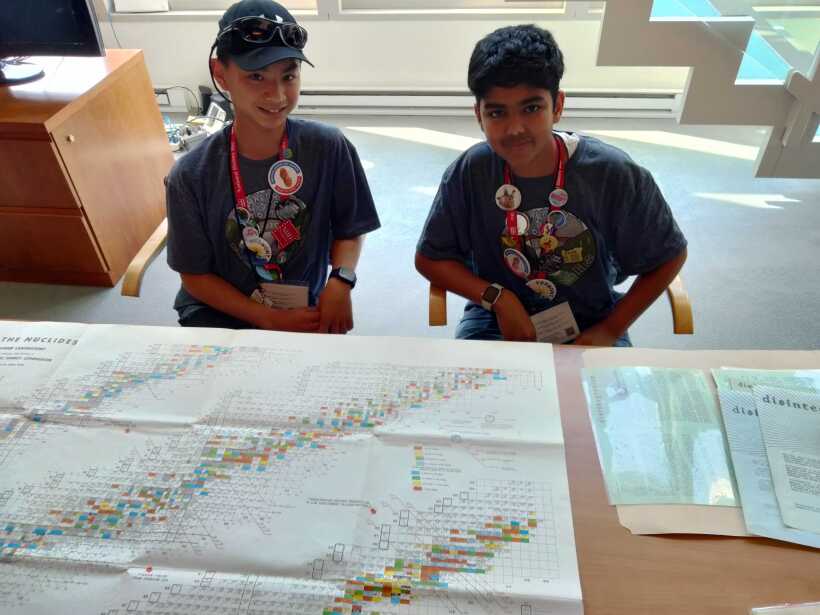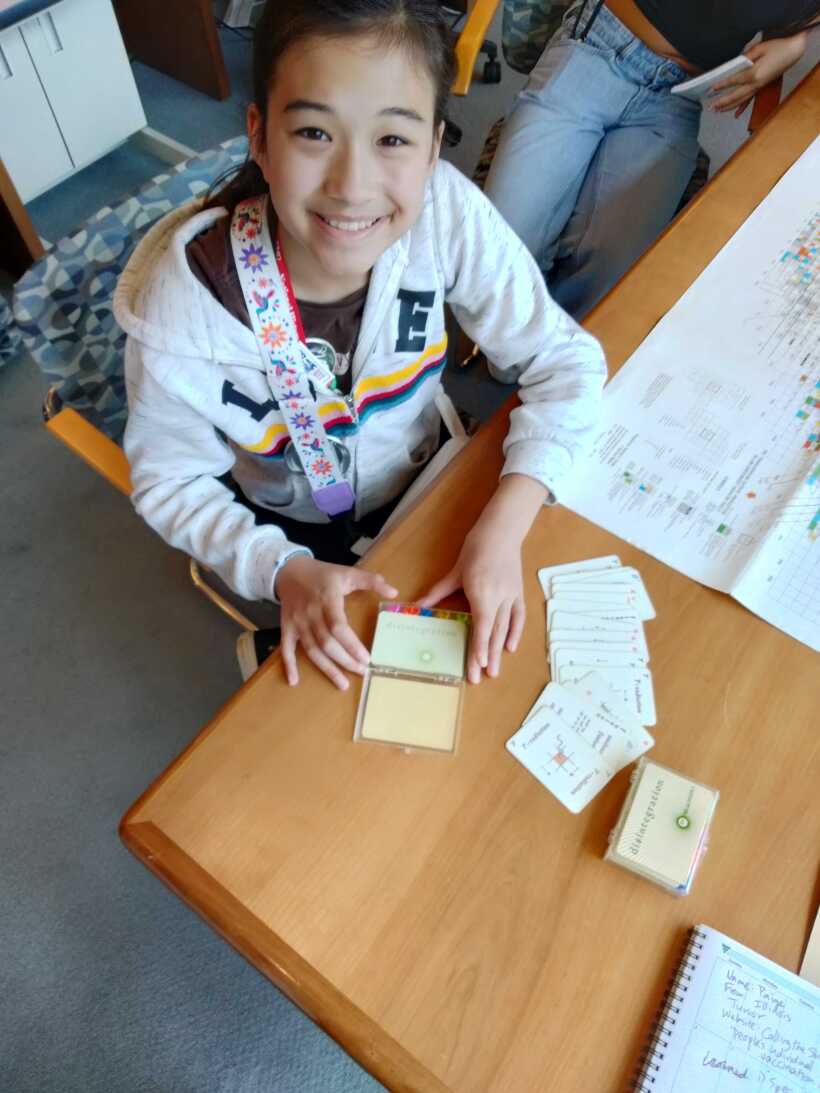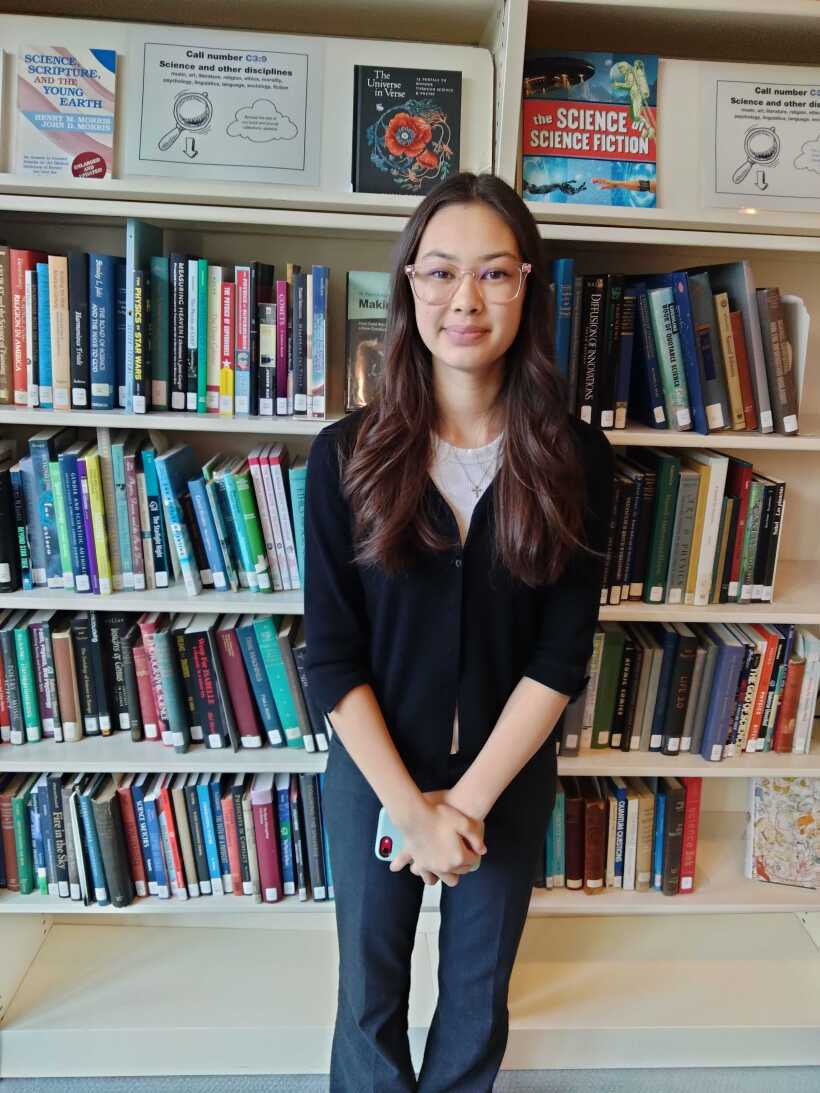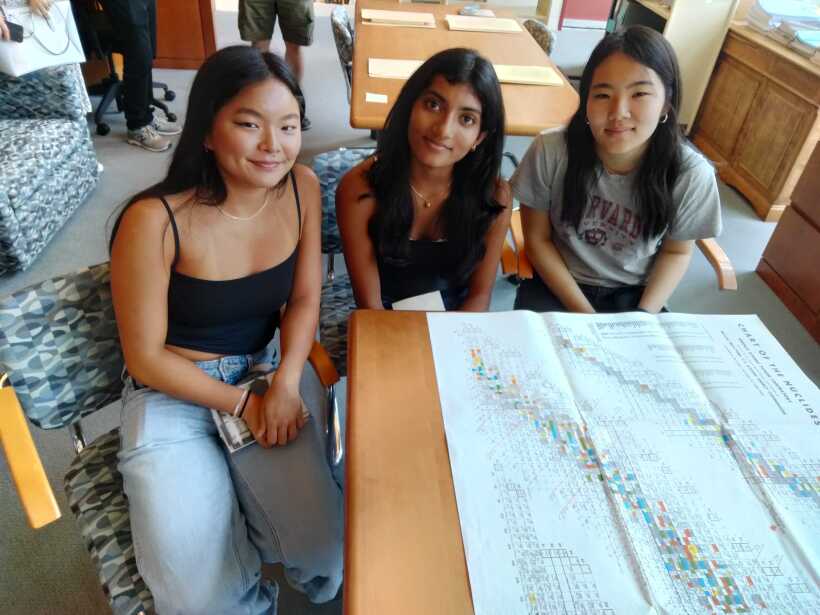Hands on with Primary Sources
The Niels Bohr Library & Archives recently played host to a segment of the population we don’t often see in our reading room in large numbers: teenagers!

Bona fide middle schoolers Wilson and Akshansh in the Niels Bohr Library & Archives reading room with a physics board game from our collections.
During the week of June 9-12, the AIP library and history staff were deeply involved with the National History Day
After examining archival collections in our reading room, we brought them behind the scenes to other parts of the building that researchers don’t usually get to see. In the processing room, where they got to learn about and touch rare books from the 16th to the 20th century, many students expressed their excitement about getting to interact with objects from so long ago. They were fascinated by the historic printing process we described to them as well.
We also brought them into the special collections and archives vault – another space that is usually only for staff.

Librarian Karina Cooper shows a book to a student, foreground. Two students enjoying themselves, background.
After the tour, we got the chance to ask the students about themselves, their projects, and what they thought of the tour of the library and archives. Please enjoy these mini interviews! All images and words are shared here with permission.

Paige with cards from a physics teaching game in the NBLA archives.
Meet Paige, a middle schooler from Illinois. Her National History Day project, a website titled “Calling the Shots: Rights, Responsibilities, and Public Health,” focused on people’s individual rights in public health, and vaccination laws in particular.
“I enjoyed learning about the special waterless fire suppression system, the game in your archive based on nuclides, and that sometimes scanners can be bigger than cars.”

Samantha
Samantha, a high schooler from California, did an exhibit called “Forbidden to Fundamental: Perez v. Sharp’s Defense of Marriage Rights and Call for Constitutional Responsibility.”
“My favorite part about the tour was the experience of being in the room and in-person with the archival material, which I previously only had experienced online. I enjoyed seeing it on the shelves and how it was stored.”

Left to right: Dahee, Sanhvi, and Sieryn
Here are Florida high schoolers Dahee, Sanhvi, and Sieryn with some of our archival material. Their group documentary, “The Aids Epidemic: the Fight for Rights and Responsibilities,” focused on the inaction of the Reagan administration, lack of care by medical professionals, as well as the impact of the stigma associated with the epidemic.
Dahee: “Favorite thing was the rare books. It was cool to see something so old and touch it and see the progression of bindings.”
Sanhvi: “My favorite was learning about the pulp paper and it was crazy to see how the older books were in better condition than more modern books because of their paper quality.”
Sieryn: “I thought it was really interesting to learn how books were printed and how each individual letter had to be laid down, and how things have changed over time.”

Left to right: Wilson and Akshansh
Wilson and Akshansh of Oregon are middle schoolers who did a group website called “Bloody Sunday 1920: The Turning Point of the Irish War of Independence.” Their project was written from the Irish perspective and highlights its role in southern Ireland’s independence.
Wilson: “I loved learning about the work you do here and how it affects the scientific community. I really enjoyed seeing your moveable shelves. I also learned that scientists aren’t always serious people.”
Akshansh: “I enjoyed learning about the research that goes on here. I really liked seeing the old books and how good their condition is.”

Left to right: Sarah, Jack, Anna, and Jiangyi
High schoolers Sarah, Jack, Anna, and Jiangyi represented Michigan with their group website ”Sovereignty on Trial: Wooster v. Georgia,” about a Cherokee court case that Jackson defied.
What did they like about the tour? In their words:
- Scope of what was in the archives and touching the books.
- The title of archivist was intimidating before, but Ben said you can email or contact archivists to ask about records and they want to hear from you and help you.
- Hearing about how difficult it is to transcribe records.

Kevin, Connor, Derek, and Christian
From Texas, meet Kevin, Connor, Derek, and Christian, middle schoolers who did a group performance called ”A Bright Idea for Education: The Individuals with Disabilities Education Act.”
“Our favorite things on the tour were the rare books, the old books, and the manuscript-like books.”

Left to right: Max and Ada holding giveaway books weeded through archival processing
On the left, Ada from Indiana is a middle schooler who did an individual performance called “Wounded Knee Massacre.”
Tour highlights: “Seeing different books and hearing what an archivist actually does.”
To the right, high schooler Max, also from Indiana, did an individual performance called “Rights and Responsibilities in Designing and Using the R7 and N1.”
Favorites from the tour? “Rare books and FREE BOOKS!”







